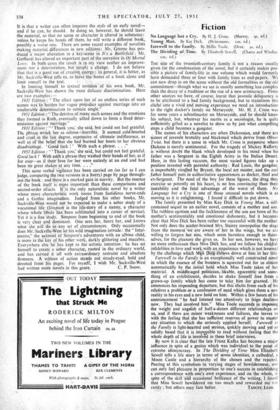Fiction
los., 6d.)
THE size of the twentieth-century family ia not a reason usually given for the condensation of the novel, but it certainly makes pos- sible a _picture of family-life in one volume which would formerly haft demanded three or four with family trees as end-papers. We can now drop in on the scene without the old formalities or the-old commitment—though what we see is usually something less complex thal the decay of a tradition or the rise of a new aristocracy. From other sources we have, of course, learnt that juvenile deliquency is to be attributed to a bad family background, but to transform this cliché into a vivid and moving experience we need an introduction to the right docker's family on Merseyside. Mr. H. J. Cross was for some years a schoolmaster on Merseyside, and he should know his subject, but, whatever his merits as a sociologist, -he is quite sufficiently gifted as a novelist to show us hy just what compelling steps a child becomes-a gangster. •
The names of his characters are often Dickensian, and there ire scenes of juvenile brutality and blackmail which derive from Oliver Twist, but there is a sense in which Mr. Cross is purposive where Dickens is merely sentimental. For the tragedy of Mickey Rafferty is without doubt the blank which developed in his mind when his father was a Sergeant in the Eighth Army in the Italian Desert. Here, in this lasting vacuum, the most varied figures take up a position invested with parental authority: Red Louis, the gangster, is improbably rivalled by Bryant, the local art master, and the real .father himself puts in authoritative appearances as docker, thief and ex-Sergeant. The need of the boy for these figures, the -drag they exercise so potently on his heart, is no less con-vincing than their instability and the fatal advantage of the worst of them. No Language but a Cry is one of those unusual novels which is as moving as it is enlightening. I found it difficult to put down. •
The family presented by Miss Kay Dick in Young Man, a aelf- contained sequel to an earlier novel, consists of a mother and son. The ruthless egotism and the fecklessness of the son are, born of the mother's sentimentality and emotional dishonesty, but it becomes clear that Miss Dick has been rather too successful with the mother. Not only does the scatter-brained Mrs. Stairey monopolise the stage from the moment 'we are aware of her in the wings, but we are willing to forgive her sins, which seem harmless enough in them- selves, for the pleasure she gives us. In her son, however, we have no more enthusiasm than Miss Di& has, and we follow his childish infidelities in love and work, with an impatience which is not lessened by the challenge which MO Dicl$ throws down at him in her title. Farewell to the Family is an exceptionally well constructed novel in which the essence of the business is squeezed out for us almost automatically by the initial hold which Miss Toole takes of her material. A middlezaged politician,-likable, egocentric and some- thing of an exhibitionist, decides to shake himself free from a grown-up family which has come to take him for granted. He announces his impending departure, but thiielicits from each of his relatives a problem or a confession of need which gives them a new reality in his eyes and a new hold on him. Within a few hours of his announcement "he had listened too attentively to feign deafness now They had involved him." Miss Toole succeeds in imposing the Weight and anggish of half-a-dozen different relationships on us, and if there are minor weaknesses and failures, she leaves us with, the feeling that she has sufficient reserves of power to master any situation to which she seriously applied herself. Farewell to the Family is light-hearted and serious, quickly moving and yet, so solidly based that it is impojsible to read without feeling that the whole depth of life is involved in these brief interviews.
By now it is clear that the late Franz Kafka has become a major influence in spite of a genius which was individual to the point of extrerne idiosyncrasy. In The Dividing of Time Miss Elizabeth Sewell tells a life story in terms of seven identities, a cathedral, a MoOn Castle and a hierarchy of the chosen and the rejected. Peering at this symbolism in varying stages of bewilderment, one can only feel pleasure in proportion to -one's success in establishing a correspondence with one's own experience, and on the whole, in spite of the skill and occasional brilliance of the writing, I found that Miss Sewell bewildered me too much and rewarded me too


































 Previous page
Previous page